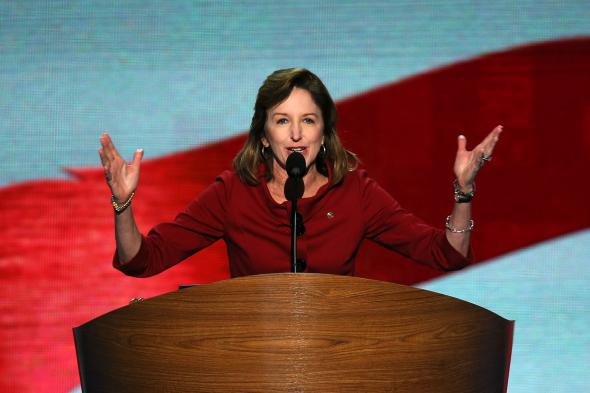If Republicans Are Proud About the Early-Voting Cutback, Why Don’t They Talk About It?

Photo by Alex Wong/Getty Images
American Crossroads is going on the air in North Carolina with this new ad against Sen. Kay Hagan. (It boosts her chief rival, Thom Tillis, who is trying to fend off a challenge from Rand Paul-backed doctor Greg Brannon.) The ad refers twice to voting reform passed in the Tillis-run House of Representatives. We learn that Hagan opposed it ...
... and that Tillis will defend it.
Now, it's perfectly accurate to refer to the law in question as "the voter ID law." But the law does more than require ID at the polls. It shortens the early-voting period from 17 to 10 days; it ends the ability of a voter who shows up at the wrong precinct to cast a provisional ballot; it ends same-day registration. The ad points out that Hagan wrote a letter to Eric Holder asking the DOJ to challenge the law, and she did, though voter ID was only one of her points of contention.
This fits into a pattern. Since last year, when Gov. Pat McCrory signed the bill into law, he and the rest of the Republicans in the state have called the law "commonsense" (this polls well) and talked almost exclusively about the voter ID components. In one particularly slippery video, McCrory attacked the "politics" behind the law's critics, mentioning nothing about the new law apart from the ID standard.
Why am I obsessing over this? Yesterday I had some fun with Matt Lewis' assertion that the Democrats were pointing reporters to stories about gerrymandering and vote restriction laws, suggesting that this got the agency completely backward. Lewis took umbrage at this.
In fact, it is the mainstream media who are presenting biased information here. For example, let’s consider the aforementioned New York Times front-page story, headlined: ”New G.O.P. Bid to Limit Voting in Swing States.” The clear implication is that the GOP is working around the clock to disenfranchise African-American voters. And how are they hoping to achieve this sinister goal and prevail as victors in November? The GOP’s signature move – the one cited by Weigel — is to limit early voting. (The other method is gerrymandering; I’ve already poked holes in that argument.)
Of course, there are two ways of explaining these positions, one much more cynical than the other. You might suggest it is a purely political calculation with the goal of suppressing African-American votes (I hope we would all agree that’s a horrible motivation that should not be condoned).
But what everyone — including Weigel — fails to mention, is the possibility that there are sincere and legitimate arguments for why early voting is a bad idea — based on its merits. This isn’t a secret. Plenty of serious and respected experts and commentators have made this point (see here, here, and here). So while there are two ways of explaining these efforts, guess which option the media chooses to believe.
Let's work backward from the links. Lewis cites three sources who advance the argument that "early voting is a bad idea": political reporter Jon Ralston, two political scientists, and himself. Neither the political scientists nor Ralston actually call for an end to early voting. The former wrote that early-voting periods can be too long, and that "even a limited few-days-early voting period could convey most of the advantages of the practice." The latter simply argued for voters to wait until Election Day in case scandalous news emerged about a candidate. Now we're talking about a state cutting back early-voting days that happen to be used in great proportions by black voters. It's one thing to say "you shouldn't eat that" and another to say "I'm going to legally prevent you from eating that."
I work at Slate, so, hey, I get the value of contrarian opinions. But that's what the aforementioned columns were offering. Contrary, but-what-if opinions. Just three months ago, the Presidential Commission on Election Administration recommended early voting as a way to expand the franchise. (Not everyone can wriggle out of work on a Tuesday to get in line for an undetermined amount of time.) Lewis says that if early-voting opponents were really making a "purely political calculation with the goal of suppressing African-American votest," we should oppose it. OK, then—I give you this story from Ohio:
“I guess I really actually feel we shouldn’t contort the voting process to accommodate the urban — read African-American — voter-turnout machine,” said Doug Preisse, chairman of the county Republican Party and elections board member who voted against weekend hours, in an email to The Dispatch. “Let’s be fair and reasonable.”
And this one from North Carolina's Buncombe County:
[Precinct Chair Don] Yelton also offered several other reasons why he supports the voter suppression law. Among them, “[i]f it hurts a bunch of college kids that’s too lazy to get up off their bohunkus [sic] and get a photo ID, so be it,” and “if it hurts a bunch of lazy blacks that wants the government to give them everything, so be it.”
Just two voices, sure, which is why I'm more convinced by the decision made by pro-Republican ad-makers, and by North Carolina's Republican governor, to talk about voting reform without ever mentioning the decision to cut back same-day registration and early voting.
